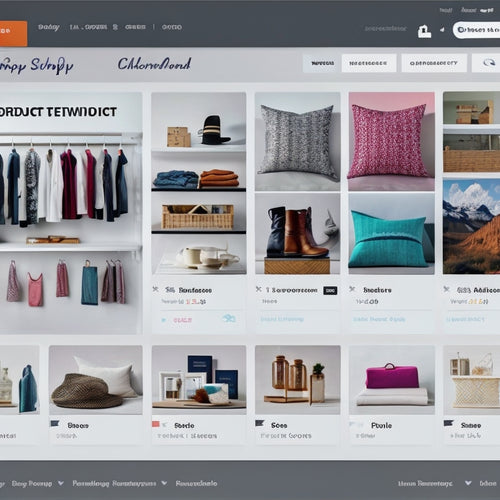
Unveiling the Secrets of Merchant Category Codes
Share
You're about to discover the hidden world of Merchant Category Codes (MCCs), which quietly influence your financial transactions. MCCs determine interchange rates, IRS classification, and customer rewards, with a staggering 60% of credit card holders unaware of the bonus categories and cashback opportunities they're missing out on due to MCC misunderstandings. You'll soon learn how MCCs impact your spending habits, from tracking expenses to optimizing rewards strategies. As you explore the importance of accurate MCCs, you'll uncover how they can save you money, streamline tax reporting, and even influence financial decisions - and that's just the beginning of what you're about to uncover.
Key Takeaways
• MCCs significantly impact interchange rates, IRS classification, and customer rewards, making accurate classification crucial for businesses and cardholders alike.
• Finding a business's MCC code can be done by contacting the payment processor, checking the credit card statement, or researching online.
• Inaccurate MCCs can lead to tax implications, non-compliance, and higher interchange fees, emphasizing the importance of precision in MCC classification.
• Accurate MCCs help businesses streamline tax reporting, negotiate improved interchange rates, and optimize rewards strategies for cardholders.
• Understanding MCCs is key to maximizing rewards for cardholders, as it enables them to tap into bonus categories and earn more cash back.
Understanding MCCs and Their Impact
As you explore the world of credit card transactions, understanding Merchant Category Codes (MCCs) becomes essential, as these four-digit numbers greatly impact interchange rates, IRS classification, and customer rewards.
MCC classification plays a significant role in shaping consumer behavior, as it determines how your spending is tracked and rewarded. For instance, if you frequent a specific restaurant, the MCC assigned to that business will influence the rewards you earn.
Additionally, interchange rates and IRS regulations are directly tied to MCCs, which can affect how much businesses pay in fees and how they're classified for tax purposes.
Finding a Business's MCC Code
You can typically find a business's MCC code by contacting the merchant's payment processor or by checking your credit card statement. This code is essential for MCC identification and processing, as it determines the impact on rewards and taxation. For instance, if you're a frequent diner, knowing the MCC code for restaurants can help you earn maximum cash back.
| Method | Description |
|---|---|
| Contact Payment Processor | Reach out to the merchant's payment processor to request their MCC code. |
| Check Credit Card Statement | Look for the MCC code on your credit card statement, usually listed next to the transaction. |
| Contact the Business | Reach out to the business directly to ask about their MCC code. |
| Online Research | Search online for the business's MCC code, but be cautious of inaccurate information. |
The Importance of Accurate MCCs
Accurate MCCs are essential for businesses and cardholders alike, since they directly impact tax reporting, convenience fees, and risk management, making it crucial to get them right.
As a cardholder, you want to make sure you're earning the right rewards, and as a business owner, you want to avoid higher rates and fees.
Inaccurate MCCs can lead to tax implications and non-compliance, resulting in penalties and fines.
They can also affect risk management, leading to higher interchange fees and impacting your business's bottom line.
Furthermore, accurate MCCs help you understand your spending habits, enabling you to make informed financial decisions and maximize your rewards.
Benefits for Business Owners
By utilizing the accurate MCC, business owners can streamline their tax reporting, diminish the risk of non-compliance, and negotiate improved interchange rates with their payment processors.
This precision is essential, as inaccurate MCCs can result in elevated rates and fees for your business. You'll also benefit from clearer tax implications, as MCCs determine how your business is categorized for tax purposes.
Additionally, having the accurate MCC guarantees proper payment acceptance, enabling you to concentrate on expanding your business rather than fretting about payment issues.
Maximizing Rewards for Cardholders
Sixty percent of credit card holders don't maximize their rewards, but understanding MCCs can help cardholders like you tap into bonus categories and earn cash back. By leveraging MCCs, you can optimize your rewards and cash back strategies.
For instance, if you frequently dine out, knowing the MCC for restaurants can help you earn more cash back. Similarly, if you're a frequent flyer, knowing the MCC for airlines can help you accumulate more miles.
Here are some ways to maximize your rewards:
- Identify your spending habits and focus on MCCs that align with them
- Choose credit cards that offer bonus categories and high cash back rates for your MCCs
- Use MCC utilization to earn cash back and rewards on your everyday purchases
Frequently Asked Questions
Can MCCS Be Changed or Updated for an Existing Business?
You can update MCCs for an existing business by requesting a change from your payment processor or credit card company, which may impact your business's interchange rates, rewards, and tax reporting, so understanding the process and potential effects is crucial.
How Do MCCS Affect Businesses With Multiple Product or Service Offerings?
You're like a master chef, juggling multiple dishes - each product or service offering requires precise categorization, impacting pricing strategies and marketing segmentation, as you cater to diverse customer preferences, ensuring each "dish" is accurately coded for maximum rewards and minimal fees.
Are MCCS the Same Across Different Credit Card Companies?
You'll find that MCCs aren't always consistent across different credit card companies, as each issuer may have variations, leading to cross-issuer differences in categorization, impacting rewards and interchange rates.
Can MCCS Be Used to Track Business Expenses for Accounting Purposes?
You can utilize MCCs to track business expenses for accounting purposes by categorizing transactions and integrating with accounting software, making it easier to monitor and manage expenses, and ensuring accurate financial reporting.
Do MCCS Vary by Country or Region for International Businesses?
When you operate internationally, you'll find that MCCs can vary by country or region, affecting global implications and cross-border transactions. You'll need to take into account local regulations and registration requirements to guarantee accurate classification and reporting.
Related Posts
-
Maximizing the Potential of Shoppable Videos on Shopify
Shoppable videos have emerged as a powerful tool for e-commerce businesses, offering the potential to engage and con...
-

How Do I Add Unlimited Products to Shopify
This article explores the process of adding unlimited products to the Shopify platform, a popular e-commerce solutio...
-

Search Shopify Apps Refine the On-Site Search Experience, Enhancing Product Discoverability
This article explores the topic of enhancing product discoverability through the use of Shopify apps that refine the...

